The Anti Inflammatory Diet Meal Plan - Life Style Guide - Part 1
What Is an Anti-Inflammatory Diet?
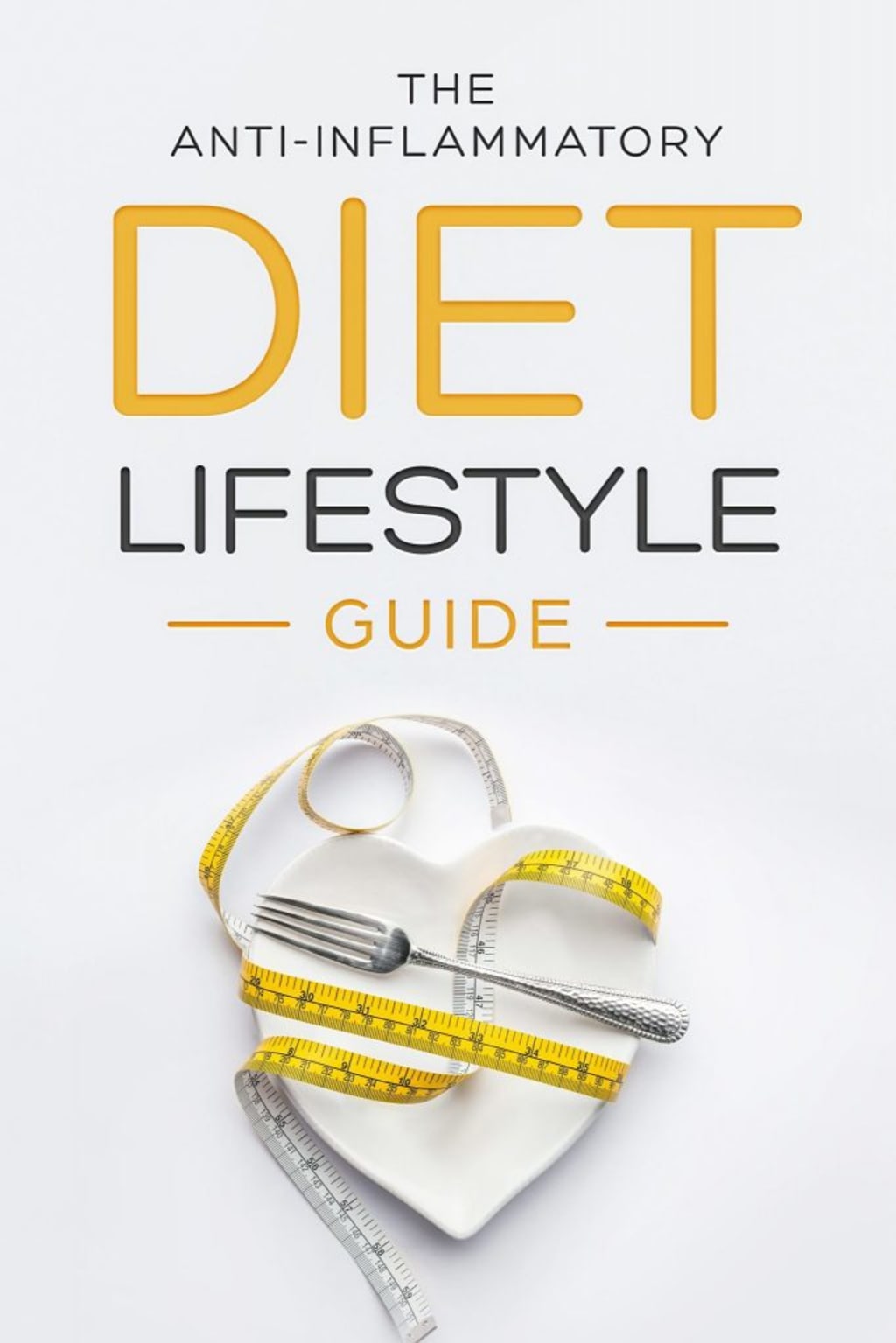
The Anti Inflammatory Diet Meal Plan - Life Style Guide - Part 1
Introduction
Inflammation in simple terms is swelling or pain in any of the body-parts caused as a result of the response by the Immune System to fight infections, wounds and any other damage to tissue. But chronic inflammation causes many diseases like cancer, heart disease, diabetes, arthritis, depression, etc.
To combat inflammation or chronic inflammation, doctors mostly use pharmacology. Thus, using anti-inflammatory drugs or creams. Now researchers have found natural foods and plant-based sources having anti-inflammatory properties to reduce inflammation in the body. Therefore, a tool to combat inflammation not from the pharmacy but from the grocery store.
The anti-inflammatory diet is not a meal plan, counting calories for fighting with the problems of obesity rather a nutritional diet that focuses on using natural whole foods and plant-based greens to combat inflammation and protecting you against diseases and keep you healthy.
Anti-Inflammatory diet not only helps to prevent obesity and cancer, but it also provides a number of health benefits like maintaining a healthy heart, boosting gut health, and even help reducing pain.
It is quite justifiable to claim that the Anti-Inflammatory diet is not only a “diet” but a healthy lifestyle. It aims to nourish your body to keep you free of chronic inflammation and keeps you away from diseases.
Check out this comprehensive guide to help you make an informed choice about following this lifestyle and adopting this dietary shift.
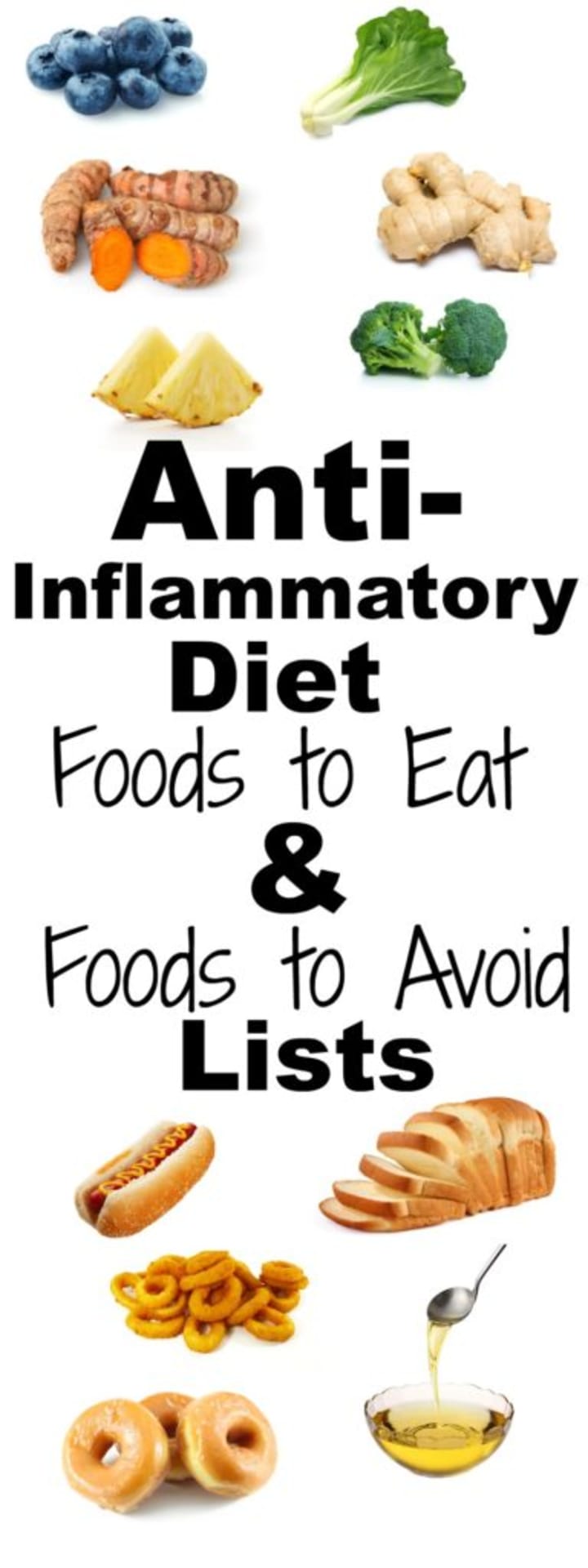
What Is an Anti-Inflammatory Diet?
The main purpose of the Anti-Inflammatory diet is to include foods that reduce inflammation in the body parts. Its aim is to help you substitute sugary and refined foods from your diet with whole, nutrient-rich foods. This type of diet is rich in antioxidants that reduce free radicals. In fact, free radicals are molecules in human bodies that may damage cells, thus, putting us at risk of many diseases.
We can witness that various popular diets already follow Anti-Inflammatory principles like the Mediterranean diet that lays emphasis on whole grains, fish and other fats good for the heart. Overall, we are to say ‘goodbye’ to those foods that trigger inflammation and say Yes to high-nutrient foods that are rich in anti-oxidants. Further, foods cooked in vegetable oils are rich in Omega-6 Fatty Acids and grain-fed beef also fall in the category of highly inflammatory foods and are not included in the prescribed Anti-Inflammatory Diet.
The reason to do so is that these foods release toxic chemicals linked to cancer and other diseases. The better option is to cook food in olive oil, coconut oil or white butter. The right AI diet focuses only on whole, unprocessed, nutrient-dense foods.
Keeping this in mind, there are five main principles of a perfect Anti-Inflammatory eating plan that will help you achieve good health.
The 5 principles of Anti-Inflammatory eating:
- To Include foods with healthy fats
- High emphasis on Omega-3-rich foods.
- Whole and Anti-Inflammatory foods.
- Cost-saving and eating on a budget.
- Lifestyle changes also.
Inflammation is done to Promote Healing
Inflammation in the form of redness, swelling, and pain occurs when the immune system fights the infection that may be related to germs, wounds, allergens, toxins or other causes.
For instance, Inflammation may also occur within the body of a patient suffering from bronchitis and lung infection. Excess body fat may also cause chronic inflammation. If inflammation prolongs and converts into chronic inflammation may damage the DNA of our body, thereby, increasing the risk for cancer.
Foods and Inflammation
Your immune system must be in a position to perform its activity in the right manner. One must remember that our overall health depends upon what & how we eat and what we think. Therefore, by changing our eating habits, we can protect ourselves from diseases and lead a healthy life.
Can eating different foods reduce Inflammation?
Yes! There are a wide variety of foods that reduce chronic inflammation in the body like monosaturated fats, omega 3 rich foods, fruits and vegetables. Hence, your diet should always include different type of foods like green leafy vegetables, nuts and seeds, fatty fish, fruits high in antioxidants like berries and citrus fruits.
Such a variety of foods have Anti-Inflammatory effects and can reduce the risk of illnesses, diseases, and other chronic inflammation symptoms.
Eating a wide variety of nutritious foods may help reduce and even eliminate inflammation in our body. So, the right food having anti-inflammatory composition makes our immune system work well and helps us not to suffer from chronic inflammation. We must have a healthy eating plan for a healthy immune system.
All You Need To Know About Inflammation
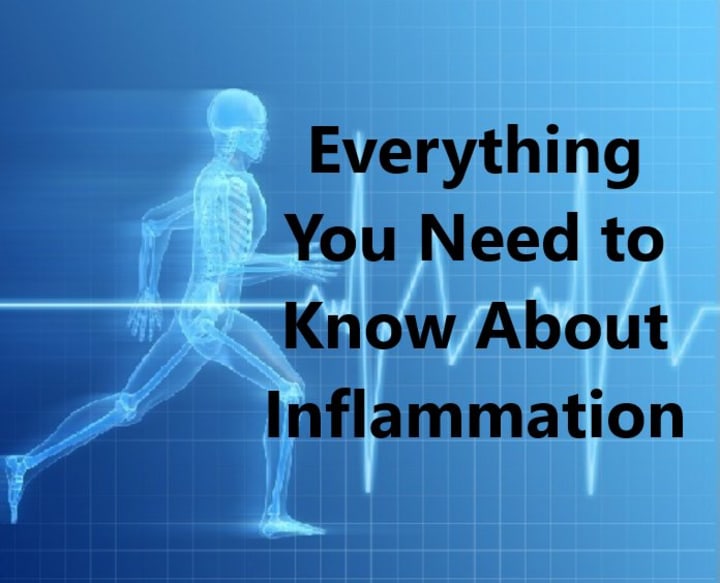
When the immune system becomes overactive to fight with the infection created by foreign invaders, this process creates inflammation and therefore Inflammation is a normal response of the body’s immune system to promote healing. But, when inflammation becomes chronic, it creates ill-health and certain diseases including cancer also.
What is Inflammation?
Inflammation is a normal body process. It is activated by the immune system to protect the damage of any tissue as a result of an infection caused by some foreign invader microbes. The Immune system stimulates different cells and proteins, to eliminate any threat of any infection in the body and repairs damaged tissues. There are chemical mediators like Cytokines that work as signals to deploy more parts of the immune system to promote healing in the body. This causes that body area to get inflamed.
Therefore, inflammation helps in our curing process. It is useful for destroying invading bacteria and microbes. Inflammation makes space to enter useful antibodies and activates other parts of the immune system to support in healing. Just like fever and blood pressure are useful to detect the onset of any disease, inflammation also helps identify body parts that need special medical care urgently.
The inflammatory response is a part of a defense mechanism in the body that immediately starts triggering all the protective mechanisms of the body along with stimulating anti-inflammatory cells to heal the area of damage.
When inflammation is so important for our smooth body function, then why do we need an anti-inflammatory diet to keep us healthy. Simply because of the fact that when it becomes chronic, it puts us to the risk of life-threatening diseases.
When is it dangerous?
In immune system disorder, the immune system starts causing excessive inflammation or triggers the inflammatory response unnecessarily.
When the immune system becomes overstimulated and starts attacking the body’s own tissues, it creates autoimmune disease. In such cases, the immune system itself causes a lot of damage and the inflammation that is supposed to heal the body, starts destroying the body’s own tissues and cells.
Acute Vs. Chronic Inflammation
Acute inflammation occurs in seconds and can develop symptoms of redness, soreness and pain.
Inflammation is a part of our body’s functioned and works as a signal for repairing our damaged tissues.
Chronic inflammation is a dangerous thing. The inflammation that remains for a long period becomes chronic and starts damaging the body’s own progressive tissues. Chronic inflammation is a cause of certain diseases like asthma, rheumatoid arthritis, depression, cancer, diabetes, etc.
Following are the common symptoms of that chronic under-the-radar inflammation might be affecting you:
- Joint pain
- Skin rashes
- Frequent headaches
- Gas formation and indigestion
- Fatigue
- Weight gain
- Gum disease
- Mood swings
Link Between Allergies and Chronic Inflammation
Allergic reactions can be caused by chronic inflammation. If you suffer from allergies all the year-round, you are always thinking about what can be the reason for this persistent issue. The reason behind this is chronic inflammation in your body which -causes you to suffer from persistent sneezing, blowing nose, cough, and respiratory problems.
When the immune system reacts to the presence of an allergen in the body, it creates antibodies and cells to protect against its damage. Hence, it results in inflammation in that body part. But when inflammation remains permanent, this is called chronic inflammation because the immune system is always over-active. Therefore, it becomes necessary to combat chronic inflammation before it starts giving signs of chronic disease.
Inflammation and Autoimmune disease go together
Chronic Inflammation impacts the working of the immune system and ultimately it starts working against the favorable tissues of our body rather than foreign invaders. If there is an autoimmune disease, certainly there is some sort of inflammation. Some common autoimmune diseases are Autoimmune Hepatitis, Type 1 diabetes, Psoriasis and Rheumatoid arthritis.
Stress Causes Inflammation
The cause of inflammation is not only the foreign invaders microbes but stress also plays a vital role in inflammation. If your stress has become chronic, it starts changing the functioning of the genes of immune cells. Immune System starts attacking the body’s own tissue.
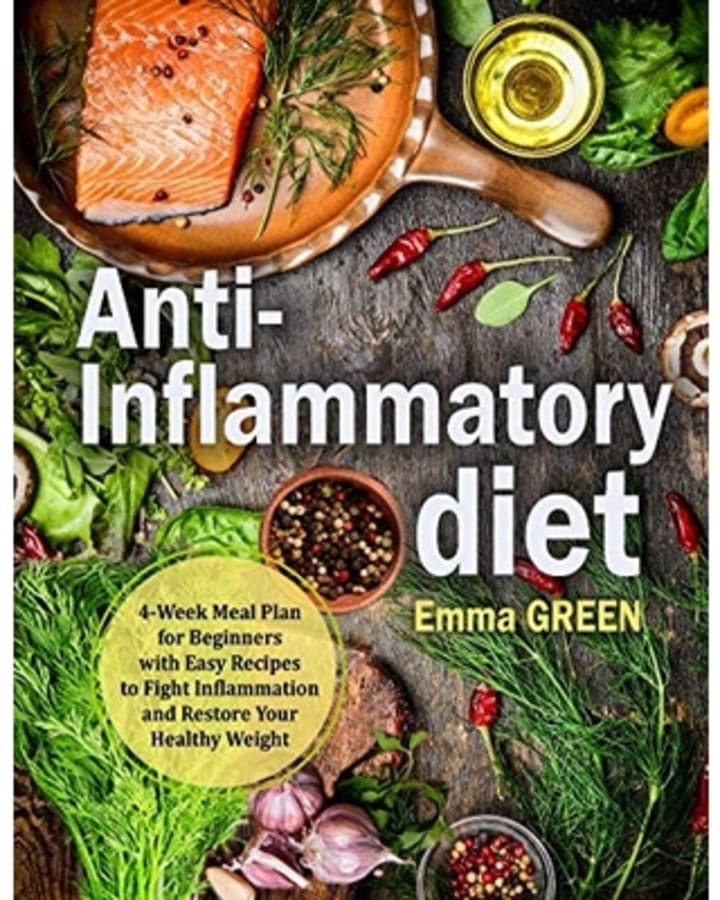
Manage And Lose Weight With An Anti-Inflammatory Diet
Nature is the best pharmacist and natural, unprocessed food is the most powerful drug to keep you healthy & fit. Obesity also has been associated with the spine, neck, and upper extremity pain.
Chronic pain also becomes one of the reasons for obesity due to pain result in obesity because it leads to physical inactivity. Thus, the reduction in weight can help reduce chronic pain. Levels of inflammatory substances circulating in the blood drop significantly.
Diet for weight loss may work temporarily to lower the number on the scale. The best diet to maintain the perfect weight and prevent inflammation is to consume plant-based foods rich in antioxidants and whole foods.
Improves Heart Health
Anti-Inflammatory foods improve blood viscosity, blood flow, manage hormone levels and clean the arteries necessary to prevent heart disease and diabetes further. Focus on a diet that contains healthy foods instead of concentrating on a reduction in calories. A healthy heart can prevent inflammation and heart diseases.
Reduced Food Cravings
Anti-Inflammatory foods are alkaline and rich in nutrition that doesn’t create unhealthy cravings thereby reducing the need to binge eat and thus help in ideal weight management and provide proper nutrition to the body. Many refined and processed foods should be consumed to the minimum. These foods create unhealthy cravings because they are nutritionally deficient. Further, they can also cause diseases that lead to problems in managing one’s weight.
Supports Blood Sugar Levels
Anti-inflammatory foods maintain our blood sugar levels naturally. When blood sugar is optimal, the level of insulin and cortisol hormones is also maintained. This further helps in maintaining a healthy weight, heart and emotional health.
Foods that are natural sources of protein such as Hemp seeds, Pumpkin seeds, Almonds and Flax, Collard greens and Lentils etc help in maintaining our blood sugar levels.
Leads To Healthy Food Choices
An Anti-Inflammatory diet is highly beneficial and diverts attention from unhealthy foods to healthy ones. Anti-inflammatory foods are easily available and affordable. Even, there is no necessity to avoid a meal. An Anti-Inflammatory diet puts more attention on healthy foods and there is no limit on calories. These foods will make you feel full.
It’s Balanced
Being rich in nutrition, and Anti-Inflammatory diet is a well-balanced diet. It is a perfect combination of healthy fats, high fibre, good proteins, and low-glycemic carbs. Intake of a variety of anti-inflammatory foods works differently for each of us and also becomes a balanced diet.
The anti-inflammatory diet makes us feel more energetic. Our life should be physically active as a sedentary lifestyle leads to high inflammation in the body. Our systems need some form of regular physical activity like walking, jogging, simple Yoga and exercise for maintaining adequate lymphatic flow in the body. This will, in turn, reduce inflammation.
4. Best Anti-Inflammatory Foods to Add to Your Diet
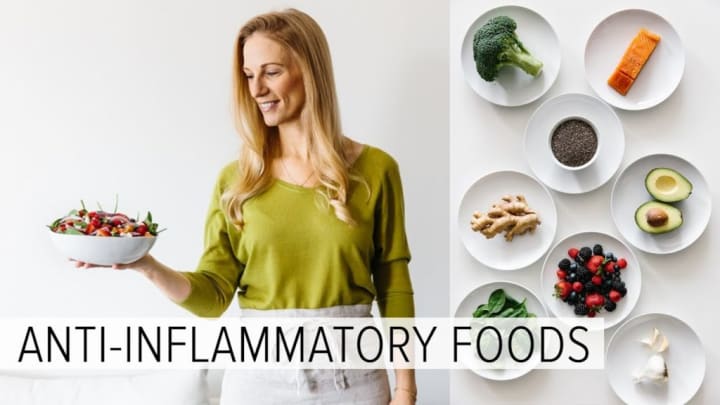
We can classify our diet in four components to achieve an Anti-Inflammatory diet, antioxidant activity, detoxifying activity, nutrient density, and hormone-regulating activity.
Most of the foods come under the above classification. These foods are best that can be added to your regular diet.
Raw cacao: has anti-inflammatory properties and may reduce the risk of diabetes. It contains magnesium, calcium, iron, zinc, copper, potassium, and manganese. Cacaohas many health benefits that are why it is known as the food of gods. Cacao consists about 300 compounds of which many comes under the category of anti-inflammatory and enriched with antioxidants. Cacao contains vitamins and minerals. For better results, we should prefer to each raw cacao without any processing and adding sugar to it.
Acai berry: Acai berry is an inch-long, reddish-purple fruit. Acai berry is a low sugar fruit contains antioxidant properties. It helps in decreasing inflammation and enhances metabolism.
Berries: Berries such as Strawberries, Blueberries, Raspberries, and Blackberries are full of fiber, vitamins, and minerals. Berries contain antioxidants called anthocyanins. These fruits have compounds that prevent inflammation in the body and reduce your risk of acute health problems.
Maca: is a root and consumed mostly in powder form. It is a hormone regulator. Maca contains Anti-Inflammatory properties.
Broccoli: It is a high antioxidant, cruciferous vegetable just like cauliflower. It contains sulforaphane, that reduces inflammation and helps to fight heart disease and cancer.
Avocados: They contain heart-healthy monounsaturated fats, carotenoids and tocopherols, that helps to reduce cancer risk. Further, avocados are a treasure house of healthy enzymes. They are rich in potassium, magnesium, fiber, and compounds that reduce inflammation.
Green Tea: Green tea is an antioxidant and has Anti-Inflammatory properties that reduce the risk of several heart diseases and obesity.
Peppers: Both Bell and chilly peppers are high in vitamin C and antioxidants and contain vital anti-inflammatory compounds with strong effects.
Turmeric: is a powerful Anti-Inflammatory herb that helps to fight several diseases like arthritis and diabetes. It is popularly known for a strong anti-inflammatory compound called curcumin.
Ginger: is a spice having Anti-Inflammatory properties. It acts as an analgesic effect also..
Grapes: Grapes contain anthocyanins that help to reduce inflammation and risks associated with obesity, heart problems, diabetes, and Alzheimer's.
Extra Virgin Olive Oil: It is a powerful Anti-Inflammatory agent and supports your heart health and reduces risk cancer and other serious health conditions.
Tomatoes: Tomatoes contain lycopene, and helpful in the reduction of inflammation and protect against cancer.
Persistent inflammation makes us suffer from various diseases. To combat with regular inflammation, we must take varied nature of diet having anti-inflammatory, and antioxidants.
5. Guidelines On Anti-Inflammatory Way Of Eating
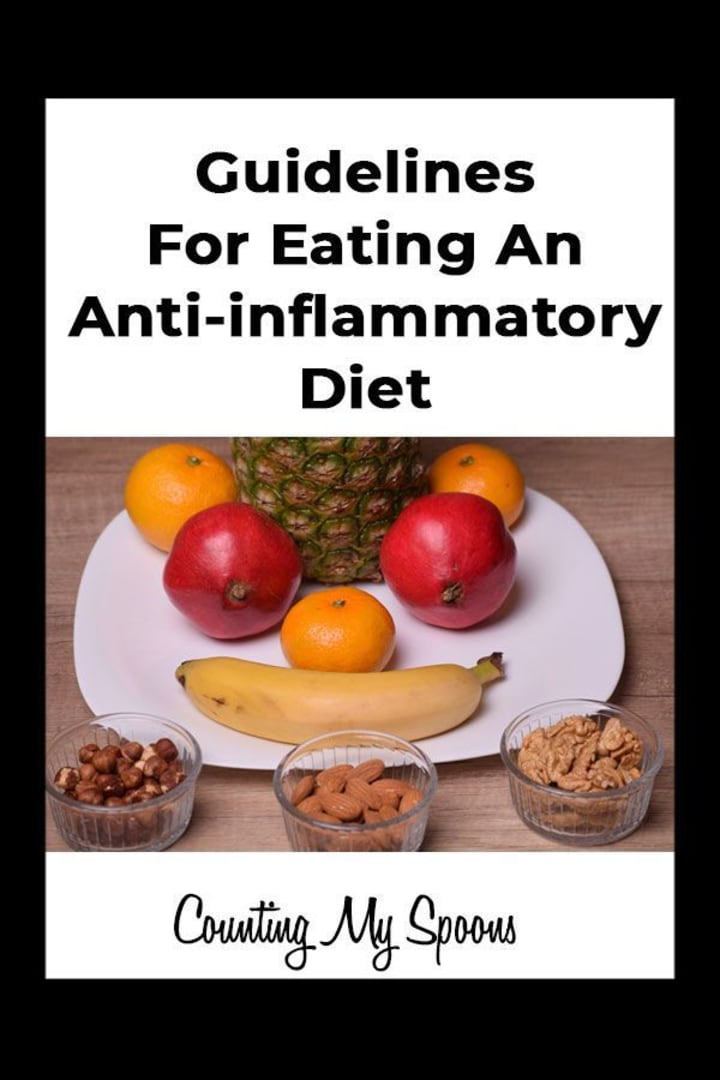
It is a fact that remedies to fight with inflammation are available in our kitchen and not from the pharmacy store. Including the right food in your diet having Anti-Inflammatory properties and in a combination is the key to good health.
On the other hand, some wrong foods may increase inflammation in your body making you more susceptible to diseases.
Foods To Eat :
Good choices for a person following an Anti-Inflammatory diet include the following:
- Dark Leafy Greens, Including Kale And Spinach
- Spice and herbs
- Blueberries, Blackberries, And Cherries
- Dark Red Grapes
- Nutrition-Dense Vegetables, Such As Broccoli And Cauliflower
- Beans And Lentils
- Green Tea
- Red Wine, In Moderation
- Avocado And Coconut
- Olives
- Extra Virgin Olive Oil
- Walnuts, Pistachios, Pine Nuts, And Almonds
- Cold Water Fish, Including Salmon And Sardines
- Turmeric And Cinnamon
- Dark Chocolate
There are some basic guidelines on how to eat, what to eat and what not to eat in Anti-Inflammatory diet and lifestyle.
- Having more Anti-Inflammatory Foods
- Eating Lots of Vegetables and Fruits
Fruits and vegetables are the best sources of antioxidants and phytochemicals that are powerful Anti-Inflammatory nutrients.
Fruits and Vegetables
A variety of vegetables and fruits including dark green, orange, yellow, red and purple, and legumes (beans and peas), is good to maintain your health and must be included in your diet. These are rich in Anti-Inflammatory compounds.
1. Increase Omega-3 Fatty Acids
Having 2-3 servings per week of Coldwater fish (salmon, sardines, and tuna), having Omega-3 Fatty Acids are helpful in reducing inflammation.
2. Increase Olive Oil
Extra-virgin olive oil is highly recommended for use in cooking. It lowers BP, LDL and fights against inflammation.
Coconut Oil
Then comes Coconut oil for cooking vegetables. It increases your good cholesterol that is HDL.
3. Include Tea and Several Spices
Use more Spices like ginger and turmeric in cooking and include a variety of teas in your diet as they contain many important Anti-Inflammatory elements.
Foods to avoid
To combat chronic inflammation, we must avoid foods that otherwise increase inflammation in our bodies.
- Too Many Carbohydrates
- Sugary Drinks
- White Pasta
- Processed Meats
- Trans Fats, Found In Fried Foods
- White Bread
- Gluten
- Soybean Oil And Vegetable Oil
- Processed Snack Foods, Such As Chips And Crackers
- Desserts, Such As Cookies, Candy, And Ice Cream
- Excess Alcohol
4. Say “No” to Foods with TFAs
Trans-fatty Acids in packaged and processed foods increase inflammation. These fats are liquid fats that are converted to solid fats during the processing of food. Hence, avoid packed and processed foods at all cost.
5. Say NO to Refined Seed Vegetable Oils
Use of seed oils such as Soybean, corn, sunflower, safflower, grapeseed, cottonseed, and wheat germ oils and processed foods should be avoided at all costs as these contain omega-6 fatty acids. The damage caused by Omega 6 Fatty Acids is irreversible in the body.
6. Reduce Red Meat Intake
Red Meat is not healthy. Hence, red meat eaters are more at risk for diabetes, heart disease, and numerous cancers.
7. Reduce Blood Sugar
- Limit Refined Carbohydrates
Refined carbohydrates cause increased insulin which promotes inflammation in the body. Hence, Foods such as white flour, white rice, white bread, and refined sugar are highly refined carbohydrates and should not be consumed.
- Adequate intake of Magnesium
The deficiency of Magnesium in the body causes inflammation. Dark leafy vegetables contain Magnesium as well as legumes, nuts, seeds, and whole grains.
- Be Patient
Diet and lifestyle changes take a lot of time. The Anti-Inflammatory way of eating can take a while to be effective. Gradually, it should become a habitual way of eating to keep you healthy in the long-run.
6. Lifestyle Hacks to Reduce Inflammation

Your diet plays a vital role in reducing inflammation and maintaining your overall good health, but at the same time, you need to change your lifestyle to a healthy one.
Stay Active
Inactivity creates inflammation in your body and results in pain in different body parts. Exercise reduces inflammation. Exercise can be in the form of any sports, walking, jogging, aerobics, dance etc.
Muscle-strengthening activities which may include weight lifting, exercises in the gym.
Good Quality Sleep
Sleep is very important. Adequate sleep in the night keeps you energetic throughout the day because the body heals and repairs itself while you sleep. A sound sleep keeps your mind & body healthy. The healthy body automatically takes care of inflammation and diseases. Poor quality of sleep cause inflammation and also health problems like type 2 diabetes and weight gain.
Stress management
Stress is very common these days. If stress prolongs and is not well managed, it may play a role in many diseases. It creates inflammation in the body, disturbs your hormones, affects digestion and metabolism. So, to fight with the stress, we must adopt some techniques to be stress-free like meditation, positive thinking, exercises, and a balanced anti-inflammatory diet.
Maintaining a healthy weight
Maintaining a healthy weight is another key factor to keep inflammation under control. Obese people are at greater risks to promote inflammation. Fortunately, even modest weight loss of 10% of body weight can help to reduce inflammation.
Add Supplements also
Besides taking regularly anti-inflammatory diet, we must add supplements that are anti-inflammatory in our diet plan. The most important Anti-Inflammatory supplements include fish oil, curcumin (the active component in turmeric), resveratrol, and tulsi (holy basil).
Yoga and Mindfulness Practice
Yoga and Meditation are the techniques that keep your body system and mind in a healthy state. It reduces stress and helps to address your health issues.
That's it for the article, like , comment and share with your family. If you really like my work then you can send me a tip as a gift so that I can provide you such content.
About the Creator
Mustafa Rangoonwala
Hello Reader,
My Name is Mustafa Rangoonwala, I am an Holistic Practitioner since last 7+ Years. I am a Graphologist, NLPMP, Reiki Master Practitioner, Ganotherapist and Vastu Consultant.
I have recently joined Vocal..Support me !!!!!!





Comments
There are no comments for this story
Be the first to respond and start the conversation.